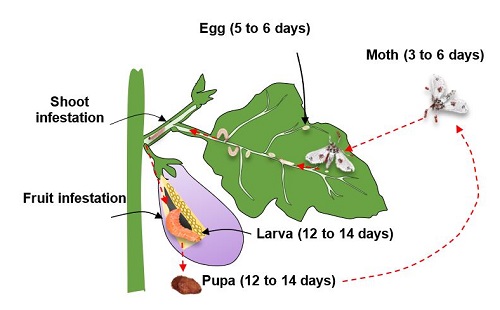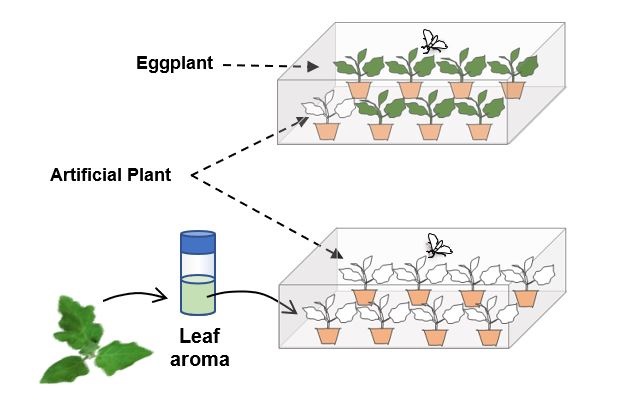
Eggplant or brinjal is a widely consumed vegetable grown throughout Asia. It is susceptible to brutal pest attacks throughout the growing season, causing huge yield loss. An Indian research team has shown how the eggplant's innate control mechanism and its biopesticide can help combat the pest Shoot and Fruit Borer (SFB).
The research team comprising members from the Indian Institute of Science Education and Research (IISER), Pune, and the Indian Council for Agricultural Research (ICAR) Complex for North East Hill (NEH) Region, Umiam, Meghalaya, was trying to find whether the chemical ecology of the eggplant-SFB interaction could be used to tackle the challenge.
“We initiated a work for finding a non-hazardous means of SFB control to integrate into its management and reduce the load of the synthetic pesticides,” informs Dr Sagar Pandit, the lead researcher.
Eggplant is the third most consumed Solanaceous vegetable in India after potato and tomato. It suffers 40-100 % fruit loss in tropical countries like India due to SFB attacks. Heavy pesticide usage needed for controlling SFB makes eggplant commercially non-viable for the farmers and risky for consumption.
SFB bores tunnels inside the tender shoots and fruits. Since they remain concealed in the fruit, their exposure to pesticides is inadequate. To overcome the challenge, farmers tend to apply a variety of synthetic pesticides in higher concentrations and frequencies. Consequently, the marketed eggplant retains heavy residues of pesticides, hazardous for the consumers.
“Chemical ecology is a science that involves studying how plants, insects, microbes, etc. interact with each other using their languages made up of chemicals. We found that a resistant eggplant variety, RC-RL-22 (RL22), releases geraniol that restricts SFB to lay eggs on its leaves. Geraniol repels female SFB moths. They fly away from the geraniol-applied plants,” Dr Pandit explains.
Eggplant or brinjal is a widely consumed vegetable grown throughout Asia. It is susceptible to brutal pest attacks throughout the growing season, causing huge yield loss. An Indian research team has shown how the eggplant's innate control mechanism and its biopesticide can help combat the pest Shoot and Fruit Borer (SFB).

The researchers extracted seven eggplant varieties' leaf aromas, dipped the filter papers in the odours to create seven different filter papers smelling like seven eggplant varieties. The moths neither touched the RL22 odour filter paper nor laid eggs on it. They landed and laid eggs on the other six filter papers, confirming that RL22 leaf aroma offered a deterrent feature.
The team also unveiled that geraniol can be produced in the lab by cloning RL22's geraniol production gene in bacteria.
“The gene can be transferred to the susceptible varieties by simple breeding to make them SFB-resistant. GMO (Genetically Modified Organisms) creation will not be required. Since it is brinjal's own gene, GMO varieties with this gene incorporated may also easily get acceptance,” adds Dr Pandit.
The application of geraniol on susceptible eggplant varieties, reduced the egg laying by 90%. “We specifically reduced the geraniol production of RL22 by silencing its geraniol production gene. These geraniol-deplete plants could not deter the SFB moths. This confirmed that RL22's SFB resistance was because of geraniol,” the researchers mention.
As geraniol has been established as an SFB deterrent, geraniol-emitting devices can be designed for installation in eggplant fields. As a long-term solution, eggplants can be bred to develop high geraniol emitting varieties.
Insects develop resistance against insecticides - especially when a single insecticide compound is used for a long duration. Therefore, it is a common practice to use the new compound in combination with other known compounds or with other pest management practices in an integrated pest management programme.
“We have started finding other natural SFB deterrents that can supplement geraniol,” the team assures.

The team comprised Rituparna Ghosh, Dennis Metze, Surhud Sant, Maroof Shaikh, Ashish Deshpande, Dnyaneshwar M. Firake, and Sagar Pandit. The study has been published in the journal New Phytologist.
India Science Wire
ISW/SM/IISER/Eggplant/Eng/19/06/2023





